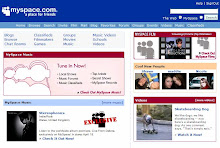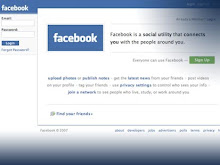Tuesday, March 18, 2008
Argument 1: Privacy
The first main point that I would like to discuss is the fact that the internet is not a private place. I realize that I have pointed this out quite a few times before, but that is because it's one of the more major issues when it comes to this topic. As I stated before, many people do not realize the little privacy they have when it comes to blog sites like Myspace, Facebook, and Xanga. Teens often post things thinking that only their friends or people they know will see it, but the fact that anyone around the world can access these websites never cross their mind. Also, the fact that school administrators or job employers have access to these sites comes as quite a surprise for many teens when they suddenly get suspended or lose a job for something they thought was only a part of their private lives. Not only is what you put on the internet public to anyone, it's permanent as well. Once you post those pictures from Friday night's party, they are vulnerable to being posted anywhere over the internet. You may think you deleted that comment you wrote when you were angry, but don't be too naive to believe it may come back to haunt you.
Subscribe to:
Post Comments (Atom)



2 comments:
I certainly would agree with you that the internet is by no means private domain. But I am not sure if you are arguing that it should be, or that some people are under the assumption that it is indeed private.
I wonder if teens our age give the visibility of myspace and facebook any thought, or if they do, and they just don't care. People, I would think, are well aware of the dangers that these and other sites possess. I have read that computer experts don't really think that computer privacy really exists, while others believe that it should exist. No matter what site a computer user is on, whether it be google or myspace, they still have no privacy. One point you could argue is that e-mailing, signing up for internet services, and just browsing the internet can all be tracked, which had been indicated by Privacy Rights Clearinghouse. This also brings up the problem with fraud and scam artists, who can acquire any type of information that they want. Unfortunately there are no published laws prohibiting hackers from tapping into people's computer history, which may be a good idea for you to consider arguing.
Once again, your topic is highly interesting and relevant, and you seem to be very well-rounded on the subject. You first argument, however, seems a little broad to be simply one aspect of the issue. Granted, I have not seen or heard your next arguments, so I may gain a different perspective at that point. For now, however, I wonder if you could possibly split up this argument, perhaps between the danger of certain pictures or posts being widely popular and the danger of these pictures or posts damaging one's reputation.
Post a Comment